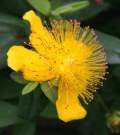 If herbal medicines are truly physiologically active, regardless of whether multiple ingredients are deemed necessary for efficacy, they should be assessed as medical products. The producers of such products should be able to offer evidence to prove this is the case and to offer safety advice regarding possible side-effects or contra-indications just as pharmaceutical manufacturers must do. The interactions and risks of countless unregulated supplements and herbal products are not known, there are usually no warnings for children, the elderly, pregnant women or those with chronic health problems turning to herbal remedies. Labelling, or rather the lack thereof, for herbal remedies is highlighted in my current editorial on Chemistry Views.
If herbal medicines are truly physiologically active, regardless of whether multiple ingredients are deemed necessary for efficacy, they should be assessed as medical products. The producers of such products should be able to offer evidence to prove this is the case and to offer safety advice regarding possible side-effects or contra-indications just as pharmaceutical manufacturers must do. The interactions and risks of countless unregulated supplements and herbal products are not known, there are usually no warnings for children, the elderly, pregnant women or those with chronic health problems turning to herbal remedies. Labelling, or rather the lack thereof, for herbal remedies is highlighted in my current editorial on Chemistry Views.
I asked industry expert Sheryl Torr-Brown for her opinion on the state of herbal medicine much of which is incorporated in the Chemistry Views article, but she had more to say than space would permit me to include, so here’s the spillover:
“Herbal medicine companies cannot have their cake and eat it,” Torr-Brown told me. “All chemicals, natural or otherwise are toxic. It is the method of limiting our exposure to such chemicals, whether it be hemlock pulled from the woods, or a paracetamol from the shelf, that determines whether they provide benefit or harm. Because of regulations and standards in the food and drug agencies around the world, we can be nourished and medicated with reasonable benefit and manageable risk. However, even in the best of circumstances, unexpected side effects can occur, sometimes serious enough to cause a drug or a food stuff to be withdrawn from public access.”
She adds that, “Herbal remedies often contain high concentrations of chemicals we usually see only in limited quantities in the foods we eat. The average consumer does not always appreciate it is possible to get too much of a good thing or that even small amounts of some chemicals can be dangerous to those taking certain medications. Even with limited quantities, the perfectly natural and unadulterated grapefruit juice can cause serious problems in patients taking certain blood pressure drugs.” The state of play regarding regulation of herbal medicine is, she adds, “A clear example of commercial interests outbalancing common sense and regard for consumer safety.”
![]() Raynor, D., Dickinson, R., Knapp, P., Long, A., & Nicolson, D. (2011). Buyer beware? Does the information provided with herbal products available over the counter enable safe use? BMC Medicine, 9 (1) DOI: 10.1186/1741-7015-9-94
Raynor, D., Dickinson, R., Knapp, P., Long, A., & Nicolson, D. (2011). Buyer beware? Does the information provided with herbal products available over the counter enable safe use? BMC Medicine, 9 (1) DOI: 10.1186/1741-7015-9-94